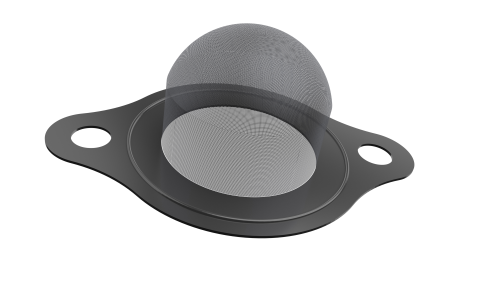
Vehicle manufacturers and suppliers are working in close partnership to develop new solutions for reducing fuel consumption and thereby also CO2 emissions. Low-pressure exhaust gas recirculation (LP EGR) systems are one example of how they are attempting to increase the efficiency of diesel engines. These systems operate on the clean air side downstream of the particle filter with a policing filter to protect the engine and turbocharger from soot and abrasive particles.
Volkswagen (VW) commissioned Emitec (Gesellschaft für Emissionstechnologie GmbH), a specialist in exhaust gas after-treatment with metallic catalytic converter holders and particle filters, to develop a new generation of LP EGR filters for filtering out particles and soot with minimum loss of pressure. Volkswagen selected the volumetric mesh, from technical weaver GKD Gebr. Kufferath AG, a manufacturer of metal and plastic woven solutions, as the filter material first installed in the Golf 7 GTD.
The tightening of exhaust gas emission limits in Europe is forcing the automotive industry to make the necessary investments in research and innovation to reduce fuel consumption while maintaining the same engine performance. In terms of CO2 emissions, an average fleet value of 130 g/km applied in 2012. However, this limit is set to be reduced by a further 27% to 95 g/km by 2020. For every gram over the limit, manufacturers will then have to pay a fine of €95 per vehicle.
For years, the automotive industry has been employing so-called twin-circuit exhaust gas recirculation systems for diesel engines as a way of reducing the CO2 emissions of passenger cars. LP EGR systems are particularly effective for heavy loads, while high-pressure (HP) EGR systems are more effective for lower loads. With low-pressure EGR, the exhaust gas is extracted downstream of the diesel particle filter, filtered, passed through the EGR cooler and then fed back to the engine's air intake system.
To ensure that this process does not lead to an increase in fuel consumption, the loss of pressure within the exhaust gas recirculation system must be kept to an absolute minimum. However, at the same time, the components on the clean air side of the particle filter must be protected from damage caused by undesirable particles. It is just as important to reliably filter out any parts breaking off the upstream ceramic particle filter as it is performance-compromising soot or oil particles.
In 2009, Volkswagen commissioned Emitec in the German town of Lohmar to design a new low-pressure exhaust gas cleaning filter for the Golf 7 GTD and light commercial vehicles up to 3.5 tonnes. The requirements that the Emitec developers had to meet for this filter included filtering out abrasive particles 0.2 millimetres and above in size, as well as soot, with no loss of pressure, thereby guaranteeing lifelong component protection without an increase in fuel consumption. So as not to compromise the efficiency of exhaust gas recirculation, the challenge was to find a filtration solution with the lowest possible flow resistance. The key component of the solution was a new kind of filter medium from GKD.
Volume porosity for effective depth filtration
Unlike the metallic fleece materials used in previous LP EGR systems, the new Volumetric Mesh from GKD offers effective depth filtration thanks to its significantly higher volume porosity. Alongside potentially destructive particles, the fibre bundles of the 3D mesh filter out the most diverse sizes of soot particles that can occur due to defective particle filters and any residual soot following regeneration of a particle filter. The patented filter modules in a new pad shape are designed to replace the bag-style filter media previously used.
In 2010, Volkswagen decided to switch over its filter media and selected the GKD pads as standard parts for the diesel engines that will be launched on the market in the autumn. Emitec then set the necessary framework conditions for use of the mesh components. The exhaust gas treatment specialist developed a tailor-made casing for the filter components to withstand the engine's severe thermal load cycles throughout its life and which complies with the exact performance characteristics stipulated. GKD supplied Emitec with the fully pre-assembled blanks with raised edge for this.
Minor steps, major impact
In the first step, Emitec produced handmade specimen casings to test the filter media both in the laboratory and in the Golf 7 GTD. Once these prototypes had demonstrated the requisite performance, small-series tools were then developed, ultimately culminating in the production of final production tools.
The results of the final serial production LP EGR filters from Emitec speak for themselves: thanks to the low pressure loss in the downstream policing filter, the new system saves between 1 and 2 g/km of CO2. Projected over 2 million vehicles with an average annual mileage of 18,000 km, this offers an annual reduction in CO2 emissions of 36,000 tonnes or 13.6 million litres of fuel. Every gram of CO2 saved in this way represents a competitive advantage for Volkswagen in terms of both resource efficiency and profitability. The new LP EGR filter ranks as a further milestone in balancing compliance with the strictest exhaust emissions limits and low consumption targets with intelligent lifecycle concepts.



